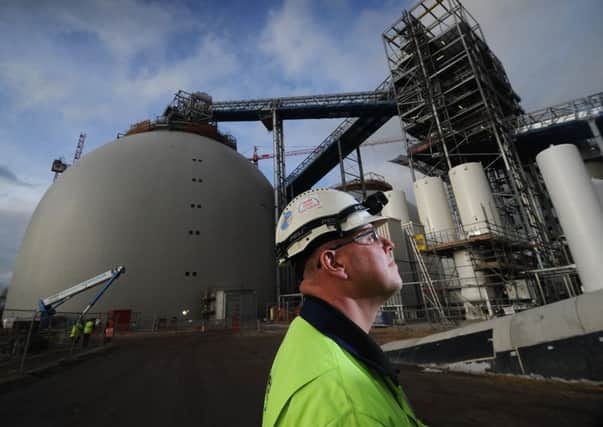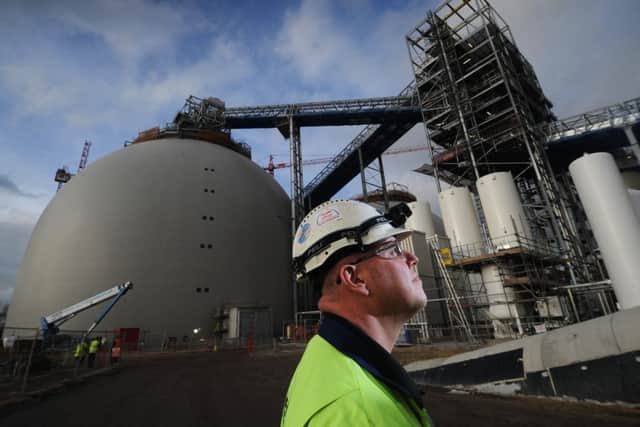Cash committed for pioneering ‘clean coal’ power station


Energy Secretary Ed Davey visited Drax power station near Selby yesterday to announce the ambitious “White Rose” power project will be the first in the country to receive funding from the Government’s long-delayed £1bn carbon capture and storage (CCS) programme.
While not yet agreeing the final go-ahead for the new 426MW coal-fired power station, the Government’s decision to fund a highly-detailed engineering study after years of deliberation is a clear signal it ultimately expects the project to go ahead – potentially creating 2,000 local construction jobs.
Advertisement
Hide AdAdvertisement
Hide AdCritically for the region, Mr Davey confirmed the scheme would include the construction by National Grid of an underground CO2 pipeline large enough for other major industrial sites around the region to use.


Planners believe this could form the first part of a Yorkshire-wide CO2 storage network that would secure the future of many of the region’s heavily polluting industries for years to come – while also potentially attracting other major industries to set up new facilities along the route.
“The White Rose project, with National Grid’s CO2 transport and storage infrastructure, really offers the potential to kick start CCS in the region, creating up to 2,000 green jobs,” Mr Davey said.
“Yorkshire is ideally suited to the development of CCS with lots of large emitters and significant storage space offshore. It’s great to be able to take it to the next stage with funding for the study.”
Advertisement
Hide AdAdvertisement
Hide AdCCS is a new technology being developed around the world to help cut carbon emissions from heavily-polluting industrial sites such as power stations.
Harmful CO2 emissions are captured before they are released into the atmosphere, then liquefied and pumped down pipelines to be buried deep underground.
Yorkshire has long been seen as the perfect place to trial the technology owing to its cluster of heavy polluters and their proximity to depleted oil and gas fields beneath the North Sea, where scientists believe millions of tons of CO2 could safely be stored.
Regional planners have been lobbying Government for years to build the world’s first shared CO2 pipeline in Yorkshire, large enough to stretch from the Aire Valley to the mouth of the Humber and taking in numerous heavy polluters along the way.
Advertisement
Hide AdAdvertisement
Hide AdIf final approval is agreed, the pipeline from Drax’s new clean coal power station should prove the first stage of that vision.
Peter Boreham, National Grid’s director of European development, said it was pleased with the announcement of funding for the venture and to be part of the White Rose project.
“This means we can continue to move forward with the development of a Humber CCS cluster that could transport carbon dioxide from the Yorkshire and Humber area to offshore storage,” he said.
The announcement was also well received at Drax, which is working together with French energy giant Alstom and UK-based industrial gas conglomerate BOC on the project through a consortium named Capture Power.
Advertisement
Hide AdAdvertisement
Hide AdCapture Power manager Leigh Hackett said it was delighted the project has been awarded a engineering design contract under the CCS commercialisation programme.
“The White Rose CCS Project has great potential to demonstrate CCS technology which will benefit other projects in the UK and overseas.
“It also highlights the strategic strength of the Yorkshire and Humber region as a hub for CCS, driving the formation of a cluster for CO2 transportation and storage,” he said.
Yesterday also marked the official launch of Drax’s £700m plan to convert half its existing coal-fired units to burn woodchips and other so-called “biomass” products instead.
Advertisement
Hide AdAdvertisement
Hide AdMr Davey said that taken together, the announcements offered a viable future for power stations such as Drax. “It’s crucial we safeguard our energy security by generating green electricity on UK soil that protects bill payers from volatile foreign energy imports,” he said.
“Our coal industry has powered Britain for more than a century, and today we’re seeing a clear roadmap for its future – whether by converting existing coal plants to cleaner fuels, or building state-of-the-art power stations that mean coal is truly clean – while at the same time creating new green jobs for Yorkshire.”